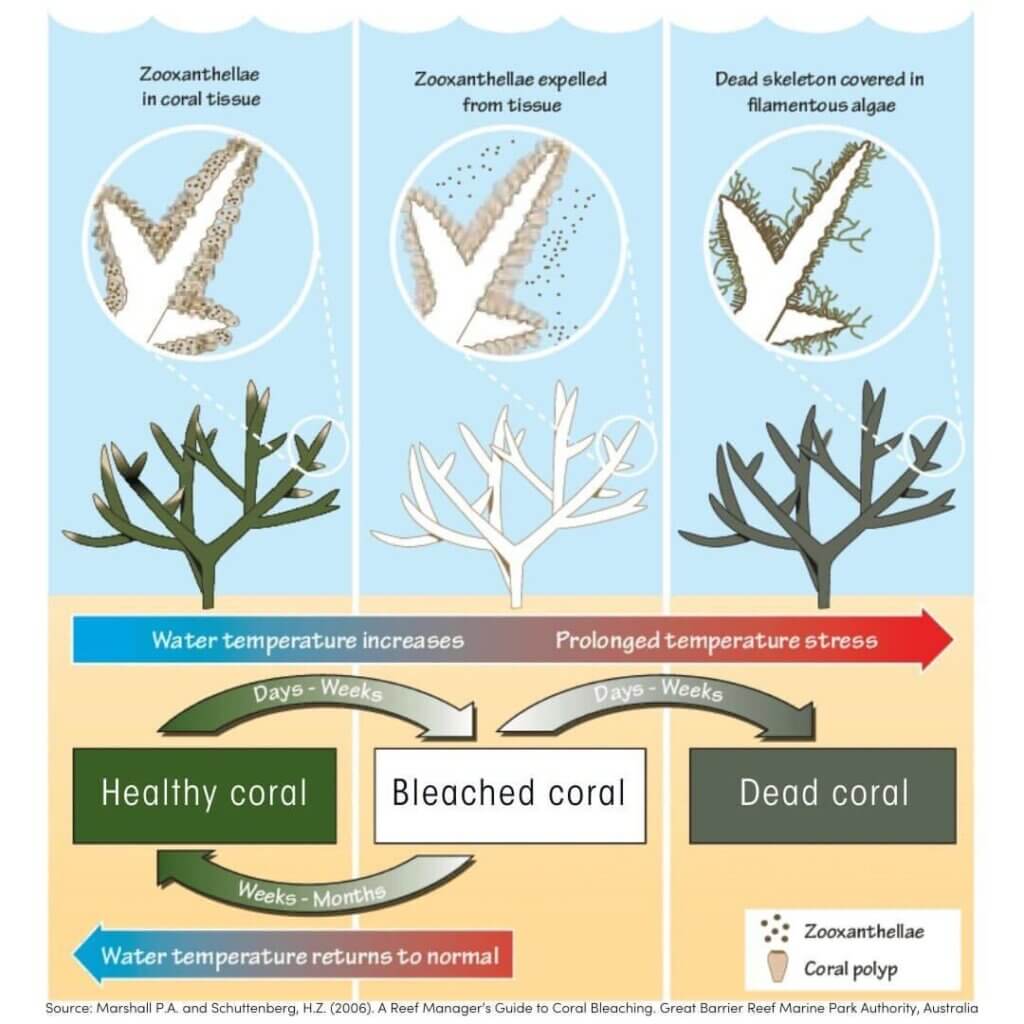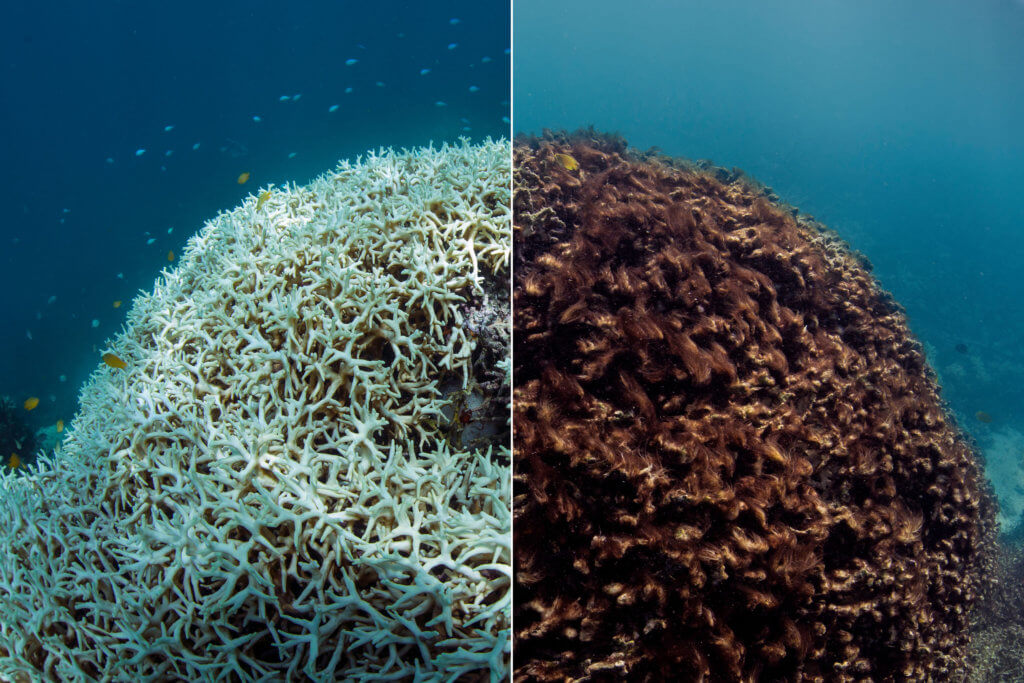Over one quarter of all marine life relies on coral reefs at some point in their life cycle. Corals are the building blocks of reef ecosystems and vital to life on earth.
Climate change is the biggest threat to coral reefs, and is making marine heatwaves hotter, longer and more frequent.
- Marine heatwaves cause coral bleaching.
- One of the many impacts of climate change is global warming, or global heating.
- Other impacts for our ocean include an increase in intensity of cyclones, ocean acidification, and extreme weather events.
Despite their beauty and importance, coral reefs around the world are disappearing fast. Water pollution, overfishing and coastal development are taking their toll on coral reefs at the local level, while carbon pollution threatens reefs worldwide and remains their biggest threat.
Record-breaking marine heatwaves are causing mass coral bleaching on the Great Barrier Reef and coral reefs globally. Since 2016 the Great Barrier Reef has suffered five mass bleaching events. In 2024, some regions in the southern reef experienced elevated water temperatures that broke all previous records for the duration of weeks. In March 2022, 91% of the Reef bleached for the first time during a La Nina weather event, which typically creates cooler, cloudier conditions.
What is coral bleaching?
When the Reef’s waters stay too hot for too long, the coral becomes stressed and expel the marine algae living inside their tissues, called zooxanthellae. Zooxanthellae provide the coral with food and energy from the sun (due to a process called photosynthesis), allowing them to grow and reproduce.
When corals get stressed, from things such as heat or pollution, they react by expelling this algae, leaving a white skeleton behind. This is known as ‘coral bleaching’. Some corals can feed themselves, but without the zooxanthellae, most corals starve. A healthy Reef can recover from coral bleaching, but it needs time and the right conditions. Coral reefs take around a decade to fully recover.

Stages in mass coral bleaching
Can coral recover from bleaching?
In some instances corals can recover from bleaching. If heat stress is not prolonged and conditions return to normal, corals can regain their algae, return to their natural colours and survive. However prolonged elevated temperatures, such as those seen in the 2024 bleaching, cause more severe and extreme bleaching that increases coral mortality.
If coral is impacted by more than heat stress, like damage from tropical cyclones and floods, and poor water quality, these cumulative impacts can leave coral living in a weakened state. It can struggle to recover, reproduce and thrive, becoming even more vulnerable to coral diseases and mortality.
It can take decades for coral reefs to fully recover from a bleaching event, so it is vital that these events do not occur frequently. If we continue burning fossil fuels at our current rate then severe bleaching events are likely to hit reefs annually by the middle of the century. This would be devastating for coral reefs as they would have no chance to recover.
We need to urgently reduce our carbon pollution and limit the global temperature increase to 1.5 degrees, or the world’s reefs will face a bleak future.
If you’re interested in diving deeper, watch our YouTube video with Professor Morgan Pratchett from ARC Centre of Excellence for Coral Reef Studies at James Cook University. The Coral reef expert answers audience questions about the 2020 coral bleaching event.
What is driving marine heatwaves?
The mining and burning of fossil fuels releases carbon pollution into the air, which is warming our oceans and causing more frequent and intense marine heatwaves. The ocean absorbs excess heat and this creates above average sea surface temperatures. Since 1900 the ocean’s temperature has warmed by 1°C. This may seem insignificant, however corals are very sensitive to temperature changes. Corals start to get stressed if temperatures increase by 1°C or more.
Why are marine heatwaves bad for the Reef?
Marine heat waves are dangerous for coral reefs because the hotter than average ocean temperatures stress corals and can lead to mass coral bleaching events. Marine heatwaves can last weeks, months or even years. If ocean temperatures remain high for eight weeks or longer, the coral cannot recover and begin to die.

A before and after photo of coral bleaching on Lizard Island, Great Barrier Reef, Queensland. Photo credit: The Ocean Agency.
What is the scientific outlook?
Scientists tell us that once we hit 1.5C of warming coral reefs will struggle to survive. If we don’t keep 1.5C of global warming within reach this decade, the harsh reality is we will see more mass bleaching events and the rapid decline of our global icon.
In just seven years, our Reef has suffered four severe mass coral bleaching events, faster and more severe than scientists predicted. If we don’t act to halt this pollution, we risk the future of our precious Reef.
We can solve the coral bleaching crisis – if we choose to
We have the solutions. With real leadership we can stop carbon pollution and allow our coral reefs to recover and rebuild. But to do this, we must quit dirty coal, and transition to renewable energy today. If we take climate leadership then our coral reefs, and the thousands of species that rely on them (which includes us), can rebuild and thrive for generations to come.
We must commit to:
- 100% renewables by 2030,
- Commit to an emissions reduction target of 75% by 2030,
- Commit to Net Zero by 2035,
- Commit to immediately ending the public funding and subsidies of coal, oil and gas,
- Commit to no further approval of fossil fuel infrastructure; and no new thermal coal, oil or gas projects.




